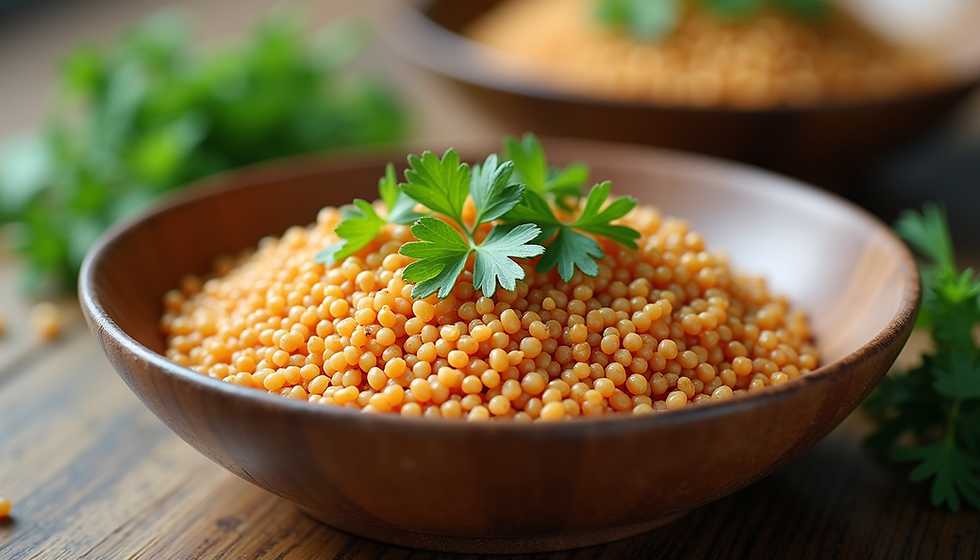Saffron Beyond the Kitchen: Unveiling the Ancient Spice's Remarkable Health Benefits
- Kristina TOSEVSKA

- Sep 19, 2025
- 3 min read
Saffron, often called the "king of spices" or "red gold," is not just a culinary delight; it also boasts a range of impressive health benefits. Known as the most expensive spice in the world, saffron comes from the delicate stigmas of the Crocus sativus flower. With its vivid color and distinct flavor, it has been revered for centuries. However, its medicinal properties are equally noteworthy.
The Journey of Saffron: From Flower to Spice
Saffron is harvested from the pistil of the saffron flower, which blooms briefly each year. Each flower produces only three stigmas, necessitating about 150 flowers to yield just one gram of saffron. This intricate and labor-intensive process, combined with the flower's short lifespan, contributes to saffron's high market value. Harvesting is done by hand, usually in the early morning when the flowers are still closed, ensuring the highest quality and color retention.
Quality assessment of saffron hinges on its coloring power, aroma, and taste. Unfortunately, the spice's high value has led to increasing counterfeiting, with many products being mixed with inferior materials. To combat this issue, the International Organization for Standardization (ISO) has set guidelines to certify saffron quality. Following these guidelines helps consumers receive genuine saffron.
The Chemical Composition of Saffron
Saffron is not merely a beautiful spice; it contains over 150 chemical compounds, including terpenes and their esters. These compounds contribute to saffron's distinct flavor and aroma and its many health benefits. Key active components like crocin, picrocrocin, and safranal have been studied for their potential health effects.
Research indicates that saffron has antioxidant, anti-inflammatory, and antidepressant properties. These effects make it a versatile natural remedy for various concerns, such as mood disorders and digestive issues.
Mood Enhancement and Mental Health
A standout benefit of saffron is its ability to improve mood and alleviate symptoms of depression. In studies, saffron has proven to be as effective as some conventional antidepressants, offering a natural alternative for those seeking relief.
The active compounds in saffron, especially safranal, have been shown to boost serotonin levels in the brain. This neurotransmitter plays a crucial role in regulating mood. Incorporating saffron into your meals may help enhance your spirits and promote overall mental well-being, especially during stressful times.

Saffron for Eye Health
Saffron's remarkable benefits extend to eye health as well. Research has shown that saffron may provide protection against age-related macular degeneration (AMD), a leading cause of vision loss among older adults.
The antioxidants found in saffron, particularly crocin, can improve blood flow to the retina, shielding retinal cells from damage. Regular consumption of saffron may lead to improved vision and overall eye health. A study indicated that participants consuming saffron experienced a 30% improvement in visual function compared to those who did not.
A Natural Remedy for Menstrual Discomfort
For many women, menstrual discomfort can be a regular struggle. Saffron has been traditionally used to ease symptoms associated with menstruation, such as cramps and mood swings. Its anti-inflammatory properties can help reduce pain and discomfort during this time.
Research suggests that saffron may improve hormonal balance, thereby easing menstrual symptoms. Incorporating saffron into herbal teas or dishes during your menstrual cycle can provide much-needed relief. For instance, a study found a 50% reduction in menstrual pain among women who added saffron to their diets.
Saffron's Role in Digestive Health
As a flavorful spice, saffron also serves as a beneficial herb for digestive health. Traditionally, it has been used to manage various gastrointestinal issues like bloating, gas, and indigestion.
Saffron's anti-inflammatory properties can soothe the digestive tract, while its antioxidants may help maintain a healthy gut environment. Including saffron in your meals not only enhances flavor but also supports your digestive system. For example, dishes like saffron-infused risotto can be both delicious and gastrointestinal-friendly.
How to Incorporate Saffron into Your Diet
After learning about saffron's exciting health benefits, you may be curious about how to include it in your daily culinary adventures. Here are some practical suggestions:
Saffron Tea: Steep a few threads in hot water to create a calming herbal tea. Adding honey or lemon can enhance flavor.
Saffron Rice: Infuse your rice dishes with saffron for a unique taste. Soak a few strands in warm water and add them to your cooking water.
Experimenting with saffron desserts such as rice pudding or ice cream can also offer a luxurious addition to your meals.
The Benefits of Saffron
Saffron is much more than a simple spice; it is a time-honored ingredient with a wealth of health benefits. From elevating mood and promoting eye health to easing menstrual discomfort and supporting digestion, saffron's medicinal qualities are truly exceptional.
Make sure to select high-quality saffron to enjoy its full benefits. Whether you use it in cooking or as a natural remedy, saffron is a treasure worth exploring. Take the plunge and experience the wonders of this "red gold" for yourself!



Comments